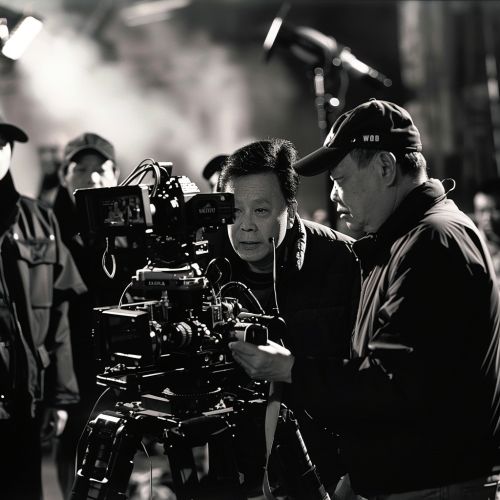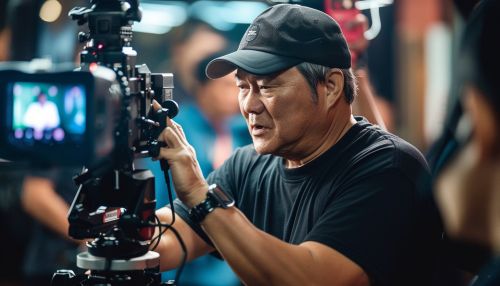John Woo
Early Life and Career
John Woo Yu-Sen, born on May 1, 1946, in Guangzhou, China, is a prominent Hong Kong film director, producer, and screenwriter known for his highly stylized action films. Woo's early life was marked by hardship; his family fled to Hong Kong in 1950 to escape the Chinese Civil War. Growing up in the slums of Shek Kip Mei, Woo faced significant challenges, including poverty and the loss of his father at a young age.
Woo's passion for cinema was ignited during his formative years. He was particularly influenced by the works of European directors such as Jean-Pierre Melville and François Truffaut, as well as American directors like Sam Peckinpah and John Ford. Woo's early exposure to a diverse array of cinematic styles would later inform his unique approach to filmmaking.
Entry into the Film Industry
John Woo began his career in the Hong Kong film industry in the late 1960s, initially working as an assistant director at Cathay Studios. He later joined Shaw Brothers Studio, where he honed his skills under the mentorship of director Chang Cheh. Woo's early work at Shaw Brothers included assistant directing and scriptwriting for various martial arts films.
In 1973, Woo directed his first feature film, "The Young Dragons," which showcased his burgeoning talent for action choreography and visual storytelling. Although the film was not a commercial success, it caught the attention of Golden Harvest, a leading Hong Kong film studio. Woo's subsequent work at Golden Harvest allowed him to further develop his distinctive style.
Breakthrough and Signature Style
John Woo's breakthrough came with the 1986 film "A Better Tomorrow," produced by Tsui Hark. The film was a massive success, both commercially and critically, and is credited with revitalizing the Hong Kong action genre. "A Better Tomorrow" introduced many elements that would become hallmarks of Woo's style, including slow-motion action sequences, intricate gunplay, and themes of brotherhood and honor.
Woo's signature style is characterized by its operatic approach to action, often described as "bullet ballet." His films frequently feature elaborate set pieces, dual-wielding protagonists, and a strong emphasis on visual aesthetics. Woo's use of slow motion and meticulously choreographed action scenes has influenced numerous filmmakers worldwide.


Notable Works in Hong Kong Cinema
Following the success of "A Better Tomorrow," Woo directed several other influential films in Hong Kong, including "The Killer" (1989), "Bullet in the Head" (1990), and "Hard Boiled" (1992). These films further cemented Woo's reputation as a master of action cinema.
"The Killer" is particularly notable for its exploration of themes such as redemption and sacrifice, set against the backdrop of stylized violence. The film's protagonist, played by Chow Yun-fat, is an assassin who seeks to atone for his past sins, a recurring motif in Woo's work.
"Bullet in the Head" delves into the psychological and emotional toll of violence, set during the Vietnam War. The film's complex narrative and intense action sequences highlight Woo's ability to blend drama with high-octane action.
"Hard Boiled" is often regarded as one of Woo's masterpieces, featuring some of the most iconic action sequences in cinema history. The film's climactic hospital shootout is a tour de force of choreography and direction, showcasing Woo's unparalleled skill in orchestrating large-scale action.
Transition to Hollywood
In the early 1990s, John Woo transitioned to Hollywood, seeking new opportunities and challenges. His first American film, "Hard Target" (1993), starred Jean-Claude Van Damme and marked Woo's entry into the mainstream American market. While the film received mixed reviews, it demonstrated Woo's ability to adapt his style to a different cinematic landscape.
Woo's subsequent Hollywood films include "Broken Arrow" (1996), "Face/Off" (1997), and "Mission: Impossible 2" (2000). "Face/Off," starring John Travolta and Nicolas Cage, is particularly noteworthy for its inventive premise and dynamic action sequences. The film was both a critical and commercial success, solidifying Woo's reputation in Hollywood.
"Mission: Impossible 2" further showcased Woo's flair for action, with Tom Cruise performing many of his own stunts. The film's success at the box office cemented Woo's status as a leading action director in Hollywood.
Return to Asia and Later Work
After a successful stint in Hollywood, John Woo returned to Asia in the mid-2000s. His return was marked by the ambitious historical epic "Red Cliff" (2008-2009), based on the Battle of Red Cliffs during the Three Kingdoms period of Chinese history. The two-part film was a major success in Asia, praised for its grand scale, intricate battle scenes, and attention to historical detail.
Woo continued to explore historical themes with "The Crossing" (2014-2015), a two-part film set during the Chinese Civil War. The film, while not as commercially successful as "Red Cliff," demonstrated Woo's versatility and commitment to exploring different genres.
In recent years, Woo has continued to work on various projects, including the action thriller "Manhunt" (2017), a homage to classic Japanese cinema. Woo's enduring influence on the action genre and his ability to innovate within different cinematic traditions have solidified his legacy as one of the most important filmmakers of his generation.
Influence and Legacy
John Woo's impact on the action genre is profound and far-reaching. His innovative approach to action choreography and visual storytelling has influenced a generation of filmmakers, including Quentin Tarantino, Robert Rodriguez, and the Wachowskis. Woo's films are often studied for their technical prowess and thematic depth, making him a subject of interest for both filmmakers and scholars.
Woo's work has also had a significant cultural impact, contributing to the global recognition of Hong Kong cinema. His films have been celebrated at international film festivals and have garnered numerous awards, including the Hong Kong Film Award for Best Director and the Golden Horse Award.
